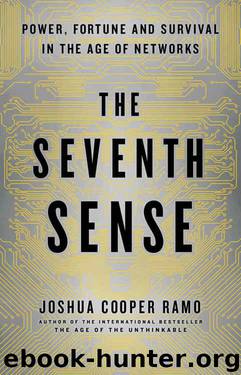0316285064 (N) by Joshua Cooper Ramo

Author:Joshua Cooper Ramo
Language: eng
Format: mobi, epub
Publisher: Little, Brown and Company
Published: 2016-05-16T22:00:00+00:00
Weizenbaum’s program quickly became famous around MIT. (The joke was that it was a better conversationalist than most of the awkward shoe gazers studying at the Cambridge campus.) ELIZA did what Weizenbaum had intended: It gave users a chance to experience what a machine with a mind of its own might feel like. Soon, the program spread to other campuses, to different research institutions, and with every step of its success, Weizenbaum found himself more distressed by the feedback he was receiving. What troubled him was not ELIZA but its users.
One after another, the humans talking with ELIZA became entranced with the computer conversation. They became convinced of the power of the machine to help them. Even professional psychologists wrote to Weizenbaum to say that his miracle machine might one day take over the work of diagnosis and counseling. This felt like a natural next step in the ceaseless progress they were used to in the rest of their lives. Better refrigerators, stronger seat belts, faster jet planes, more plastic—why not a computer doing therapy? It sounded kind of wonderful. “A number of practicing psychiatrists seriously believed the DOCTOR computer program could grow into a nearly completely automatic form of psychotherapy,” Weizenbaum wrote a few years later in his masterpiece Computer Power and Human Reason. He was horrified. Weizenbaum knew that the empathy ELIZA was exuding was faked. It was just code. “I had thought it essential, as a prerequisite to the very possibility that one person might help another cope with his emotional problems, that the helper himself participate in the other’s experience.” He concluded, “science has been gradually converted into a slow-acting poison.”
“Would you mind leaving the room?” Weizenbaum’s secretary said to him once, lost in a particularly personal discussion with ELIZA. “This reaction to ELIZA,” he wrote, “showed me more vividly than anything I had seen hitherto the enormously exaggerated attributions an even well-educated audience is capable of making, even strives to make, to a technology it does not understand.” And this made him nervous. Who, exactly, did understand the technology? Certainly not the users. But all the same, here was his secretary, with only the dimmest idea of how the machine might really work, open to the most intimate sort of discussion with it. Trusting it. The immense power of such machines—and of the people who might control them—rattled Weizenbaum. “The computer programmer,” he concluded in a flash of uneasy insight, “is a creator of universes for which he alone is the lawgiver.”
Download
This site does not store any files on its server. We only index and link to content provided by other sites. Please contact the content providers to delete copyright contents if any and email us, we'll remove relevant links or contents immediately.
| Anthropology | Archaeology |
| Philosophy | Politics & Government |
| Social Sciences | Sociology |
| Women's Studies |
Cecilia; Or, Memoirs of an Heiress — Volume 1 by Fanny Burney(32559)
The Great Music City by Andrea Baker(32020)
Cecilia; Or, Memoirs of an Heiress — Volume 2 by Fanny Burney(31957)
Cecilia; Or, Memoirs of an Heiress — Volume 3 by Fanny Burney(31943)
We're Going to Need More Wine by Gabrielle Union(19049)
All the Missing Girls by Megan Miranda(16033)
Pimp by Iceberg Slim(14513)
For the Love of Europe by Rick Steves(14140)
Bombshells: Glamour Girls of a Lifetime by Sullivan Steve(14077)
Talking to Strangers by Malcolm Gladwell(13374)
Norse Mythology by Gaiman Neil(13371)
Fifty Shades Freed by E L James(13244)
Mindhunter: Inside the FBI's Elite Serial Crime Unit by John E. Douglas & Mark Olshaker(9345)
Crazy Rich Asians by Kevin Kwan(9293)
The Lost Art of Listening by Michael P. Nichols(7507)
Enlightenment Now: The Case for Reason, Science, Humanism, and Progress by Steven Pinker(7315)
The Four Agreements by Don Miguel Ruiz(6766)
Bad Blood by John Carreyrou(6623)
Weapons of Math Destruction by Cathy O'Neil(6282)
